
BUSINESS
|
Cooperatives must form the backbone of India’s developmentIFFCO -- a beacon of hope in India's business firmament: Meira KumarBy Deepak Arora
Lok Sabha Speaker Meira Kumar has said that cooperatives can provide security and truly empower the poor and, therefore, must form the ‘backbone of our development’. One of the focus areas of her lecture was self-help groups in India. She referred them as ‘a critical dimension of human empowerment’. Delivering the 24th Jawaharlal Nehru Memorial IFFCO lecture here, Mrs Meira Kumar further added that new laws need to be ushered so as to facilitate the conversion of SHG’s into cooperative societies as this will enable real leadership to emerge; especially among women members and will help integrating them into the processes of decision-making.
Lok Sabha Speaker Meira Kumar also presented prestigious “IFFCO Sehkarita Ratna” and “IFFCO Sehkarita Bandhu” Awards, both recognizing outstanding efforts of individuals who have great contribution in promoting the cooperative movement of India, to Ranmal Singh and D.Venkat Rama Reddy, respectively. “IFFCO Sehkarita Ratna” was also presented to Samar Pal Singh former Minister of Cooperation, Uttar Preadesh, for the year 1995-96.
She recalled the role of Pt. Jawaharlal Nehru in shaping the cooperative movement in India and paid rich tributes to him. Another focus of her lecture was to emphasis how self organisation of
She also emphasized on training for cooperators,institution building at the grassroots level and use of cooperative education to spread the values and principles of cooperation among the larger public. Mrs Meira Kumar lauded the role of Indian Farmers Fertiliser
She also appreciated IFFCO, its management and entire IFFCO family for the
dedication and vision with which all are working to make it a leading Dr U.S. Awasthi, Managing Director, IFFCO, said that the Cooperatives
can play an extremely useful role in various sectors like fertilizers, He added that the Cooperatives are playing a very important role and urged them to work for the overall development of the country. He said that special emphasis needs to be given to the development and progress of the rural areas of India. Dr Awasthi cited the outstanding efforts of IFFCO’s farm forestry arm IFFDC which has helped thousands of farmers and farm women.
D. Venkat Rama Reddy, who was given IFFCO Sehkarita Bandhu Award (2010-11), has been associated with the cooperative movement for more than four decades and is considered as a friend, philosopher and guide for the cooperative movement in Andhra Pradesh. Born in village Parlapelly of Andhra Pradesh on 16th April, 1926 he was associated with Gattududdennapplly Large Size Cooperative Society for 25 years. He introduced farm produce procurement activities, established a seed processing plant, started retail outlets of all agricultural inputs in villages and was instrumental in establishing a milk cooperative society in his area and has been awarded with various laurels for his work. Samarpal Singh, who has been given IFFCO SehkaritaRatna Award (1995-96), is an eminent cooperator from Uttar Pradesh State. He is considered as an encyclopedia of cooperatives, specialist of Agriculture. Born in village of Aharaula Mafi in Moradabad District of Uttar Pradesh on 19th December 1923. He was Cooperative Advisor to Chief Minister of Punjab from 1961-62, also was Dy. Director (Farms) in Pantnagar Agricultural University. He was Vice-chairman Nainital District Cooperative Bank (1964-65). Singh, in his quest for knowledge, has visited many countries in Europe and America to acquire valuable information about Agriculture and cooperation. He is a prolific writer and many of his articles on Agriculture and Cooperation have been published in leading national magazines. Indian Govt should take faster decisions: Mukesh Ambani
He also called for a dramatic shift in the governance model for better partnership between the government and the private sector in delivering more value to each other, and the society at large. Speaking at the opening session of the annual Indian Chapter of the World Economic Forum (WEF) in Mumbai, Ambani said the corporate sector wants both the central and state governments to "align and move a lot faster", remove the mismatch prevailing in their approaches, and speed up the decision making process. He said that the private industry has now become a driver, from a facilitator, of India's economic growth. "I think there is a mismatch. We are both heading to the same direction and sometimes, like you have seen in the US and Europe, that's the price of democracy, but we shouldn't put a thing by saying that because the institutions of democracy are there, we will be paralysed. "And because there is an opposition and a party in power, we would do nothing. That's what worries me," he said, while urging for a minimum agreement to deliver on the expectations of the people. Ambani, head of India's largest corporate entity Reliance Industries and the country's richest person, also acknowledged that the government was taking steps in that direction. Paralysis in policy decisions and government inaction on important economic issues has been a matter of debate in the recent past, with many industry leaders seeking urgent steps from policy-makers to tackle the problem. Ambani said there was a need to "put our heads down and figure out how do we deliver in terms of making sure that all the framework is defined, at the same time we are still able to move fast. "... We need to get a minimum agreement in terms of saying that at the end of the day we are there working for all people and we have to have a pathway to move into the 21st century governance so that the rules are redefined and we can meet the aspirations of the millions of our young people." Corporate leader Azim Premji, chairman of IT giant Wipro, recently criticised the government for its failure to address the economic issues. "The biggest concern is over the governance issues. There is complete absence of decision-making among the leaders in the government," Premji had said earlier in the month. These comments came after a group of prominent personalities, including Premji, Mahindra group's Keshub Mahindra and HDFC's Deepak Parekh, in an open letter to the national leadership had expressed concerns over a series of scams leading to what they termed as "governance deficit". However, another industry leader Sunil Mittal of Bharti Group differed with this stance and recently said that "business is better than perception" in the country. Praising the government for its initiatives to deal with the current economic issues, Mittal had said after a meeting with the finance minister Pranab Mukherjee that the government was taking various pro-active steps. Pakistan grants MFN status to IndiaISLAMABAD, Nov 2: In a significat step, Pakistan on Wednesday granted the Most Favoured Nation (MFN) status to India that will help in improving bilateral ties and boosting two-way trade currently standing at USD 2.6 billion. "After a lengthy discussion and a briefing by the Commerce Secretary, the Cabinet unanimously approved the Commerce Ministry's summary to grant Most Favoured Nation status to India," according to Pakistan Information Minister Firdous Ashiq Awan. The MFN status, which means that Pakistan will give trade treatment to India at par with its other partners, is likely to boost the bilateral economic ties. India had granted the MFN status to Pakistan way back in 1996. Pakistan's move to grant MFN status to India comes ahead of the November 10-11 SAARC Summit in Maldives, where the Prime Ministers of the two countries are expected to meet. All stakeholders in Pakistan, including the military, were "on board" for the decision to grant MFN status to India, Awan said. MFN status will give impetus to India-Pakistan trade: Anand Sharma
Sharma said “we deeply appreciate this positive gesture that Pakistan has taken…when bilateral economic engagement improves, it brings prosperity and growth to both the partners.” Sharma, who spoke to his Pakistani counterpart Makhdoom Amin Fahim immediately after the Pakistani Cabinet decided to grant MFN status to India, said it would be beneficial for both the countries. “It opens up new pathways of alleviating our economic engagement to a much higher level,” the Minister said. Pointing out that the move would also help improve political relationship between the countries, Mr. Sharma said: “It will be influencing definitely in positive manner…we need to sustain this in the coming months.” Under the MFN status, Pakistan will treat India on a par with its other favoured trading partners. India has already granted this status to the neighbouring country in 1996. India-Pakistan commercial negotiations were revived in April this year, after a gap of four years. Post-Mumbai attacks in 2008, the bilateral trade was badly hit. In 2010-11, the bilateral trade stood at $2.6 billion. In April 2011, business negotiations were revived with Commerce Secretary-level talks in Islamabad. These were followed by Mr. Fahim's visit to New Delhi in September this year. Pakistan Commerce Secretary Zafar Mahmood would be visiting India in mid-November for further review of economic ties. Indonesian delegation meets India's Food MinisterBy Deepak Arora
During the meeting, the delegation discussed latest trends in the foodgrain production and increasing requirement of various food commodities. Mr. Alimoeso said that due to shortfall of rice production in Indonesia, there is a need to import rice in his country. India, one of the major producer of rice can fulfill the requirement. The delegation also discussed edible oil requirement of India and its import to India from Indonesia. Indonesian Ambassador Gen Andi M Ghalib and other offcials of the embassy were also part of the delegation. Prof. Thomas appraised the delegation of the PDS system in India and foodgrain productions and management. He said India at the moment has enough foodgrain stock and may consider request of Indonesia. Senior officials of the Ministry of Food and Food Corporation of India were also present during the meeting. IFFCO Experience in soil rejuvenation and productivity enhancementBy Deepak Arora NEW DELHI, Oct 18: Food and nutritional security is important to any country and India is not an exception to this. Achieving this on sustainable basis is indeed a gigantic task. IFFCO, world's largest cooperative, continues to provide services to the farmers and cooperatives through various field programmes such as rejuvenation of soil health, water resource development, mitigating climate change and transfer of technology so as to bring about a perceptible change in the area. The Indian population has increased from 361.1 million in 1951 to 1210 million in 2010 and it is estimated to be at 1400 million by year 2025 thus requiring at least 300 million tonnes of foodgrains and other commodities from the diminishing arable land and available resources requiring 40-45 million tones of nutrients and additional demand for secondary nutrients (sulphur) and micronutrients (zinc, boron etc.) as well. IFFCO, world's largest cooperative, continues to provide services to the farmers and cooperatives through various field programmes such as rejuvenation of soil health, water resource development, mitigating climate change and transfer of technology so as to bring about a perceptible change in the area. Indeed this is a tremendous strain on natural resources. Only alternative that appears to be in sight is to increase farm productivity in crop/ cropping system by bringing an element of efficiency in farm operations.
Dr. Awasthi further added "IFFCO being farmers own cooperative Society has analyzed the problem and has organized an in- depth study which transpired that that there is an urgent need for ensuring responsible nutrient use for enhancing nutrient use efficiency; promotion of secondary and micronutrient use; and soil testing laboratories. Ensuring Responsible Nutrient Use for Enhancing Nutrient Use Efficiency. The imbalanced and inefficient use of fertilizers should be pushed towards balanced and efficient use by correcting existing nutrient deficiencies using on farm and off farm inputs. As it is not so easy to enhance fertilizer consumption as per need in view of constant dependence of Indian fertilizer industry on imported raw materials as well as finished materials (fertilizers) and also the exorbitant cost of both the raw materials and the fertilizers, hence, promotion and continuous refinement of technologies like in situ recycling of crop residues/ farm wastes, and preparation and use of nutrient enriched organic manures, green manures, agro-industrial by-products, biofertilisers etc. along with fertilizers should receive greater attention. This approach will help achieving goal of balanced crop nutrition and high nutrient use efficiency. Soil amendments (gypsum in sodic soils, lime in acid upland soils), moisture conservation in the semi-arid and arid regions, efficient application of water in irrigated areas, use of organic manures in coarse-textured soils etc. will pave the way for higher nutrient use efficiency. Unfortunately, marketing and distribution of soil amendments has received far less attention than that of fertilizers in India. If constraints are to be removed, then the necessary inputs and resources should be easily available to the cultivators. Promotion of Secondary and Micronutrient Use With a changed face of balanced fertilization, more systematic and enlarged efforts would be needed for the promotion of S, Mg and micronutrients like Zn, B, Fe etc along with NPK as a part of Fertilizer Best Management Practices (FBMPs). There is lot of scope and need to educate farmers about FBMPs to increase food, feed, fiber and fuel production to meet future demand. Needless to emphasize that suitable literature in simple language should be developed and distributed to the farmers. Soil Testing Large scale adoption of FBMPs may be difficult unless the soil testing laboratories (STLs) and their recommendations earn the trust and faith of the farmers. Soil test based fertilizer recommendations should help achieving medium and high yield targets to satisfy the needs of different endowments. Soil testing service has to be revamped by expansion of soil testing laboratories (STL) network, modernization of analysis facilities, vital linkages between STLs and research organizations, public-private partnership, efficient transmission of soil-test based recommendations to the farmers, human resource development and above all inclusion of professionalism. Fertiliser industry can play a key availing the benefit of their strong linkages with the Government Department and State Agriculture Universities. There is urgent need to develop ready- reckoners on fertilizer recommendations for at least two yield targets of major agricultural and horticultural crops grown on different soils. When nutrients are used efficiently, a given quantum of crop production can often be obtained with lower input and the cost of unit production goes down, and minimum possible adverse effect on the environment is expected. Soil Rejuvenation and Productivity Enhancement Based on above factors, IFFCO decided to re-energize services so as to tackle multi –facets problems of soil fertility and plant nutrition. Thus with an aim to rejuvenate improve soil health and improve farm productivity IFFCO started a project on Soil Rejuvenation and Productivity Enhancing Project in Bighapur Block, Unnao District in Uttar Pradesh during 2009-10. During the project, IFFCO reiterated its emphasis on integrated and balanced use of fertilizers. Demonstrations carried out on farmer’s fields have proved that integration of various sources of nutrients increases crop productivity and improves soil health. Soil Rejuvenation and Productivity Enhancement Project, Bighapur Block, Unnao District, Uttar Pradesh The project was initiated in 16 villages of Bighapur Block, district Unnao, Uttar Pradesh from May 2009 onwards to address the issues related to deterioration of soil health resulting to crop productivity stagnation / decline in cropping systems through soil rejuvenation to build farmers capacity by enriching their knowledge towards scientific agriculture and to increase crop productivity and income for better livelihood. In the light of encouraging results, the project was extended to 117 villages of Bighapur block of district Unnao, which is serving as a model for breaking yield stagnation through soil rejuvenation. The salient findings of the project are as under: Demonstrations on Cereals, Pulses and Oilseeds: Results of 718 demonstrations conducted on hybrid rice, high yielding basmati rice, hybrid maize, early pigeon pea, urd bean, sesame, wheat, barley, mustard, chickpea, pea, lentil and potato indicate an increase of 39 percent to 76 percent yield in different crops with improved fertiliser practices over farmer’s fertilizer practices during 2009-10. Increasing Productivity of Rice-Wheat Cropping System: Record yield of over 100 q/ha of paddy was achieved in 15 demonstrations, 80 to 100 q/ha in 34, 60 to 80 q/ha in 25 and 50-60 q/ha in 11 demonstrations against the average productivity of 28q/ha of Bighapur block of district Unnao. The average productivity of 106 wheat demonstration was 57.59 q/ha against average productivity of 32.03 q/ha of Bighapur block of district Unnao. Enhancing Productivity of Pulses: The productivity of pulses increased significantly by providing critical inputs viz. seeds of improved varieties, biofertilisers, DAP, phosphor gypsum and zinc sulphate with best management practices. The cropping intensity was increased by taking short duration mung bean as a catch crop between wheat and rice. Introduction of short duration pigeon pea – wheat cropping system in place of sorghum + pigeon pea mixed cropping system helped improving soil health and farmers profit. Both mung bean and black gram were introduced as spring season crop after harvest of mustard and potato. These interventions assisted in increasing area under pulse crop. Crop Diversification: Saplings of most promising varieties of fruit crops (papaya, banana, mango, aonla, cittrus, bel, guava, karaunda and kaitha) and improved / hybrid seeds of vegetables (bitter gourd, egg plant, cauliflower, cucurbits, cucumber, okra, radish, chillies etc.) were distributed to farmers to increase fruit production. Reclamation of Alkali (usar) Land: The paddy productivity prior to reclamation varied between 9 to 20 q/ha with average productivity of 13 q/ha which after reclamation increased to 15.8 to 55.4 q/ha with average productivity of 36.4 q/ha showing 2.8 times increase in paddy productivity. Field programmes were organised to educate farmers to achieve the goal of productivity enhancement through best management practices. A nationwide project on Soil Rejuvenation and Productivity Enhancement was initiated during 2010-11 and it is continued during 2011-12 with focus on rejuvenation of soil health to improve crop productivity. The project activities are soil testing, reclamation of problematic soils, development of organic sources, recycle of crop residue, green manuring, composting (vermicompost, PSNC), Biofertilisers, supply of farm implements through cooperatives – rotavator, happy seeder, seed cum fertiliser drill, paddy transplanter, potato planter, sugarcane trash cutter, cono weeder, onion grader, water resource development – rejuvenation of water bodies, creation of new water bodies, lift irrigation, drip irrigation, sprinkler system, conservation of ground water. Other need based activities viz. promotion of bio gas, bee keeping, summer ploughing etc were undertaken as per local conditions. Through these activities it is possible to bring about sustainability in agricultural development. To conclude IFFCO, besides production and marketing of fertilisers, will continue to provide services to the farmers and cooperatives through various field programmes. Thrust areas will be - a) rejuvenation of soil health, b) water resource development, c) mitigating climate change and d) transfer of technology so as to bring about a perceptible change in the area. There is an urgent need to initiate and implement the above concept in a village or cluster of village by likeminded organizations so as to bring about sustainable agricultural development in the country. Vikram Renjen nominated as Advisor to the Board of Neptune IndiaBy Deepak Arora
Vik currently heads the Banking, Financial Services and Insurance division of Sutherland Global Services, a leading BPO services company based out of USA. Before joining Sutherland, Vik was the Division Vice President and Senior Executive at AIG, with overall responsibility of leading and executing the Globalization strategy for the Domestic Brokerage Group. Prior to that Vik was Senior Vice President at Prudential Financial and worked in various roles with Prudential Mortgage Capital Company, Relocation and Real Estate Services and Prudential Healthcare as a Business O&S Executive. He also worked for many years at Chase Manhattan Bank and was responsible for leading and managing various functions within the Retail Financial Services Division, including Credit Cards and Remittance Processing Departments. Vik has over 20 years leadership experience in the Financial Services and Insurance Industry with extensive knowledge of setting up and running global entities. He also brings with him a deep background on Business Expansion Strategies, including organic and non-organic growth. Vik has a MBA from America University, Washington DC and is also an alumnus of Wharton Business School, University of Pennsylvania’s Executive Development Program.
“Vik will be a tremendous asset to the Executive Team and our Board, and I’m sure he will introduce a very strategic dynamism to the Board as we move forward,” said Deepak Kapoor. “I believe that Neptune is clearly a candidate poised for exponential growth in the Power Sector in India. I feel privileged to have the opportunity to contribute towards Neptune’s global expansion strategies, with a very dynamic Board and exceptional executive team”, said Vik Renjen. Neptune India Limited, founded two decades ago, aims to “Revolutionize the Indian Power and Energy Sector” by introducing latest innovative and technically developed world renowned energy saving and power quality management, and power distribution products into the Indian market. Neptune has mastered its strength through winning a distinctive name in the international electrical arena of hi-tech range of Power Factor and Power Quality equipment i.e. Capacitors, Energy Analyzers, Automatic Power Factor Relays, Energy Management System & Harmonic Filtration, by partnering with Ducati Energia s.p.a Italy. Neptune, has the credit of introducing in the Indian market, Cee Insulated Plug and Sockets through its partnership with Bals Elektrotechnik,Germany. Neptune’s Power Distribution Division, manufactures high quality Power’D L.V. Switchboards for its wide range of customers including Airports, Metro, Hotels, Hospitals, Commercial Complexes, Industries etc. Neptune is rightfully acknowledged as pioneers in the field of Energy Management and Power Quality. India, Indonesia CEOs Bali Summit in December: Ambassador Andi M GhalibBy Deepak Arora
Ambassador Ghalib informed that the decision to hold the CEO Bali Summit was taken during the recent meeting between the Indonesian President Susilo Bambang Yudhoyono and Indian Prime Minister Manmohan Singh. He said President Yudhoyono’s visit saw the two countries signing 32 MoUs, including 18 Business to Business and 14 Government to Government. The Indonesian President's visit further strengthened the strategic and economic and trade ties between the two countries. The Ambassador said the two leaders also set the bilateral trade target from current US $ 12 billion to US $ 25 billion by 2015. “The CEO Bali Summit will help realize the enhanced target of trade between the two countries,” said Ambassador Ghalib.
Some of the top Indian business leaders who have been invited for the Bali Summit include Mukesh Ambani, Chairman & Managing Director of Reliance Industries; R. S. Sharma, Chairman & Managing Director of Oil and Natural Gas Corporation, Brij Mohan Bansal, Chairman and Managing Director of the Indian Oil Corporation; Arup Roy Choudhury, Chairman and Managing Director of NTPC; Ratan Tata. Chairman of Tata Sons Group; Sunil Bharti Mittal, Chairman and Managing Director of Bharti Airtel; A. M. Naik, Chairman and Managing Director, Larsen and Toubro; B. Prasada Rao, Chairman & Managing Director of Bharat Heavy Electricals Ltd; S. Gopalakrishnan, CEO & Managing Director of Infosys Technologies; and Azim Premji, Chairman of Wipro. |
|
||
Aviation
| Business | Defence
| Foreign Affairs | Communication
| Health | India |
United Nations
India-US | India-France
| Entertainment | Sports
| Photo Gallery | Tourism
| Advertise with Us | Contact
Us
© Noyanika International, 2003-2009. All rights reserved.
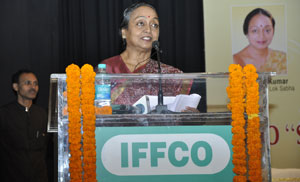 NEW DELHI, Nov 21:
NEW DELHI, Nov 21: 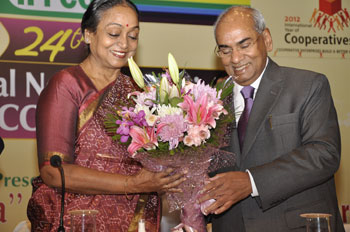 She went on to say that the Self-Help Groups which are small informal groups
and their federations which are formal groups of informal members also
need to evolve as self-sustaining unit and imbibe the principles of
cooperatives.
She went on to say that the Self-Help Groups which are small informal groups
and their federations which are formal groups of informal members also
need to evolve as self-sustaining unit and imbibe the principles of
cooperatives.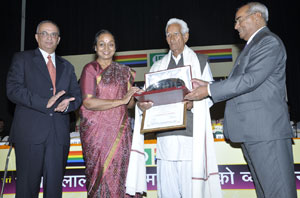 In her lecture, Mrs Meira Kumar focused at the cooperatives and Self-help Groups and also presented the challenges faced by them in the present scenario.
In her lecture, Mrs Meira Kumar focused at the cooperatives and Self-help Groups and also presented the challenges faced by them in the present scenario.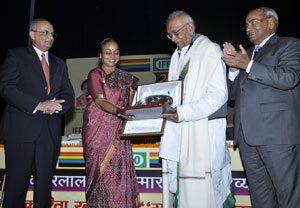 Mrs Meira Kumar said that in the present dynamic economic and
Mrs Meira Kumar said that in the present dynamic economic and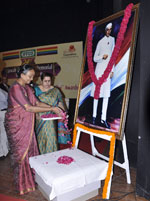 She said that “IFFCO is true to its values, it has steadfastly remained committed to the needs of its members in particular and the Indian farmer across the country”.
She said that “IFFCO is true to its values, it has steadfastly remained committed to the needs of its members in particular and the Indian farmer across the country”. 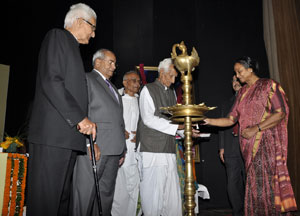 Ranmal Singh, who was given IFFCO SehkaritaRatna Award (2010-11), is a veteran cooperator, social reformer and a freedom fighter from Rajasthan. Born in Sikar District of Rajasthan on 21st November, 1923 in a family of farmers, Singh has been
dedicated to the cause of farmers and cooperatives since 1954 and has
been instrumental in organizing Gram Sewa Sahakari Samiti in Katrathal
and was instrumental in making the cooperatives in Sikar District
autonomous. Singh is actively involved in promotion of education,
abolishing child marriages, eradication of dowry system, curtailing
the expenditure on marriages
Ranmal Singh, who was given IFFCO SehkaritaRatna Award (2010-11), is a veteran cooperator, social reformer and a freedom fighter from Rajasthan. Born in Sikar District of Rajasthan on 21st November, 1923 in a family of farmers, Singh has been
dedicated to the cause of farmers and cooperatives since 1954 and has
been instrumental in organizing Gram Sewa Sahakari Samiti in Katrathal
and was instrumental in making the cooperatives in Sikar District
autonomous. Singh is actively involved in promotion of education,
abolishing child marriages, eradication of dowry system, curtailing
the expenditure on marriages MUMBAI, Nov 13: Lauding the private sector's role in driving India's economic growth, country's top industrialist Mukesh Ambani on Sunday urged the government to move faster in its decision making and put to rest any notion about policy paralysis due to political constraints.
MUMBAI, Nov 13: Lauding the private sector's role in driving India's economic growth, country's top industrialist Mukesh Ambani on Sunday urged the government to move faster in its decision making and put to rest any notion about policy paralysis due to political constraints.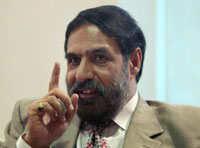 NEW DELHI, Nov 2: India's Commerce and Industry Minister Anand Sharma has said that Pakistan's decision to grant India the Most Favoured Nation (MFN) status would give the much-needed impetus to bilateral trade, besides improving political ties between the two neighbours.
NEW DELHI, Nov 2: India's Commerce and Industry Minister Anand Sharma has said that Pakistan's decision to grant India the Most Favoured Nation (MFN) status would give the much-needed impetus to bilateral trade, besides improving political ties between the two neighbours.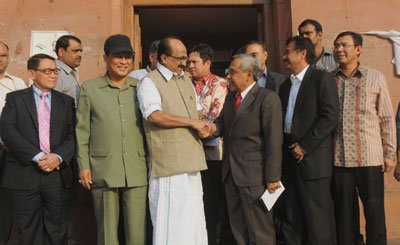 NEW DELHI, Nov 2: A delegation of Indonesian National Logistic Agency led by its Chairman, Mr Sutarto Alimoeso, called on Minister of Consumer Affairs, Food & Public Distribution, Prof. K.V.Thomas, here on Wednesday. The delegation has come to explore possibility of import of rice from India.
NEW DELHI, Nov 2: A delegation of Indonesian National Logistic Agency led by its Chairman, Mr Sutarto Alimoeso, called on Minister of Consumer Affairs, Food & Public Distribution, Prof. K.V.Thomas, here on Wednesday. The delegation has come to explore possibility of import of rice from India. 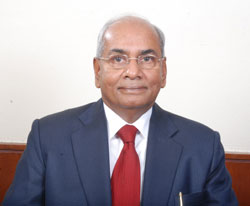 IFFCO Managing Director Dr. U S Awasthi has recently opined that "Agriculture in Today’s India has reached a critical stage and here the role of fertilizer industry becomes crucial, as they have long association with the farmers, in-depth understanding of farming and ability to invest. Fertiliser industry is thus, capable of influencing farmers’ decisions as they enjoy a higher degree of credibility among the farming community."
IFFCO Managing Director Dr. U S Awasthi has recently opined that "Agriculture in Today’s India has reached a critical stage and here the role of fertilizer industry becomes crucial, as they have long association with the farmers, in-depth understanding of farming and ability to invest. Fertiliser industry is thus, capable of influencing farmers’ decisions as they enjoy a higher degree of credibility among the farming community." 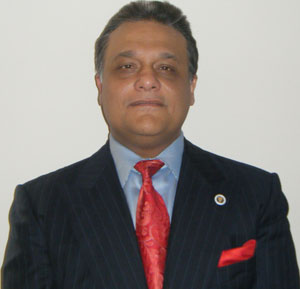 NEW DELHI, Oct 7: Neptune India Limited has announced that Vikram (Vik) Renjen has been nominated as an advisor to the Board of Directors of Neptune India
Limited.
NEW DELHI, Oct 7: Neptune India Limited has announced that Vikram (Vik) Renjen has been nominated as an advisor to the Board of Directors of Neptune India
Limited. Vik is a very strong leader, astute strategic thinker and marketer. “We look forward to benefiting from Vik’s insights and experience as an Advisor to Neptune’s Board,” said Deepak Kapoor, Neptune’s Chairman.
Vik is a very strong leader, astute strategic thinker and marketer. “We look forward to benefiting from Vik’s insights and experience as an Advisor to Neptune’s Board,” said Deepak Kapoor, Neptune’s Chairman. 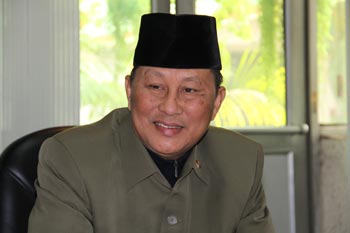 NEW DELHI: India and Indonesia trade and economic ties would seek to reach a new height when over 300 top business leaders from the two countries would meet during the Bali Summit in December this year, according to Gen Andi M Ghalib, Indonesian Ambassador.
NEW DELHI: India and Indonesia trade and economic ties would seek to reach a new height when over 300 top business leaders from the two countries would meet during the Bali Summit in December this year, according to Gen Andi M Ghalib, Indonesian Ambassador.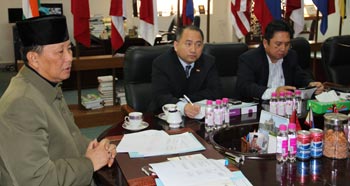 While recalling the historic ties with India, the Ambassador always refers to Indians as “Kita Bersandara” (We are brothers). He has already travelled to 25 States in India to strengthen the bilateral trade, tourism and cultural ties between the two countries.
While recalling the historic ties with India, the Ambassador always refers to Indians as “Kita Bersandara” (We are brothers). He has already travelled to 25 States in India to strengthen the bilateral trade, tourism and cultural ties between the two countries.
